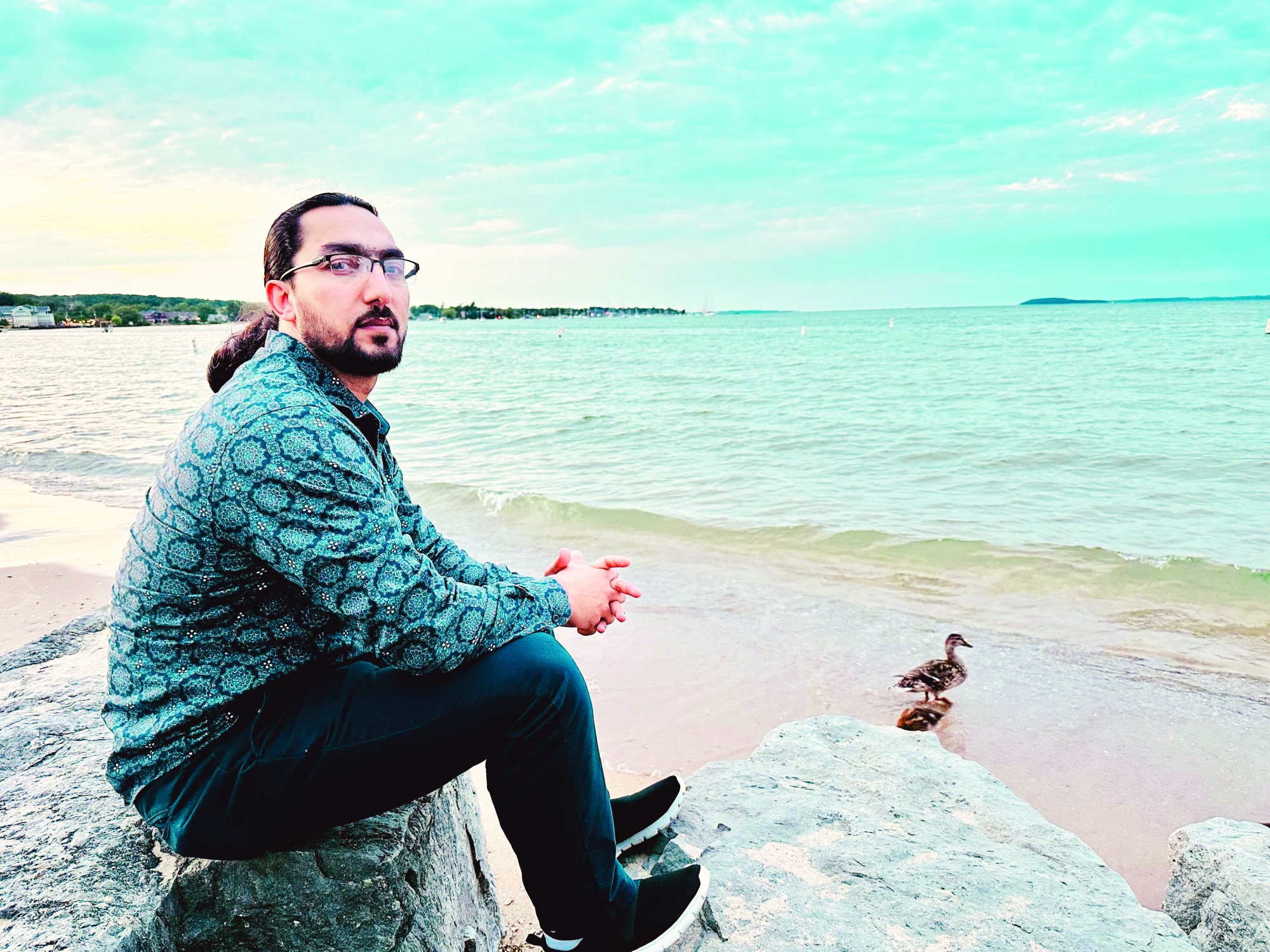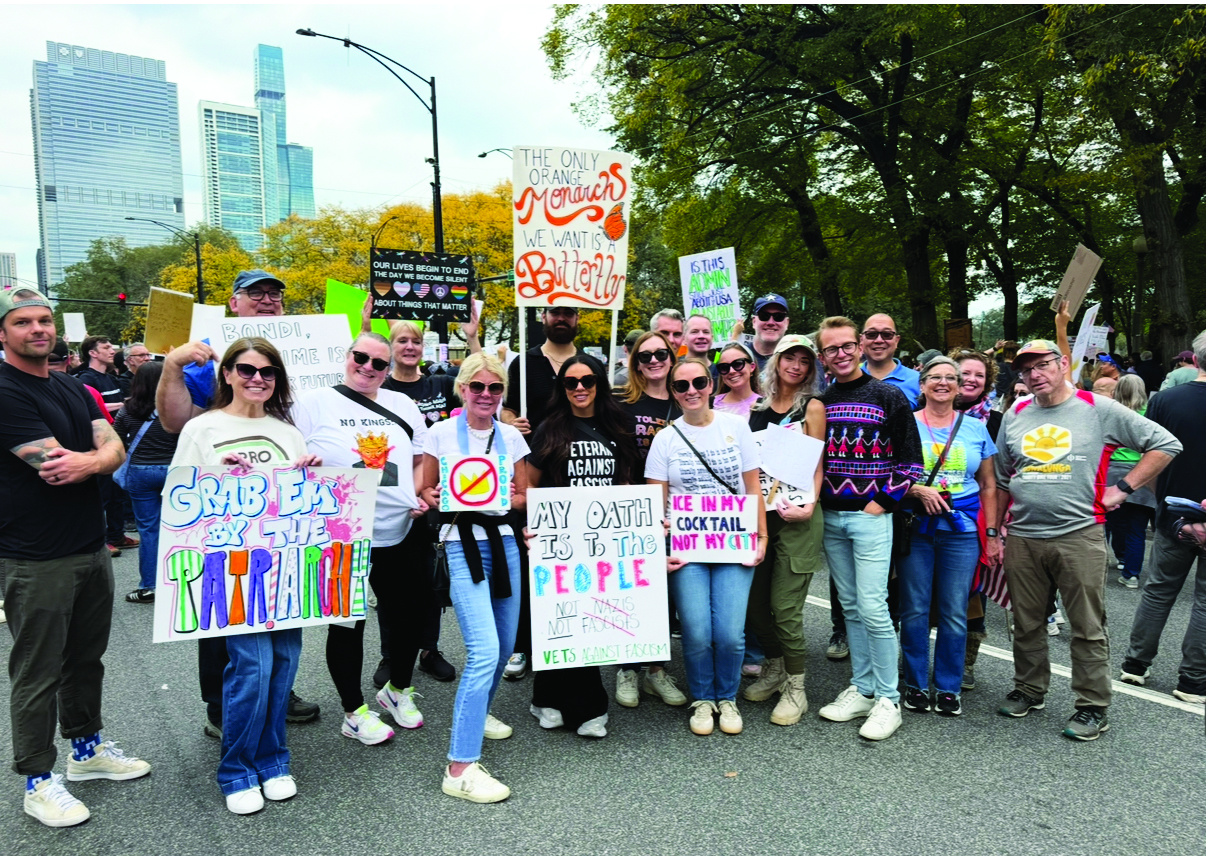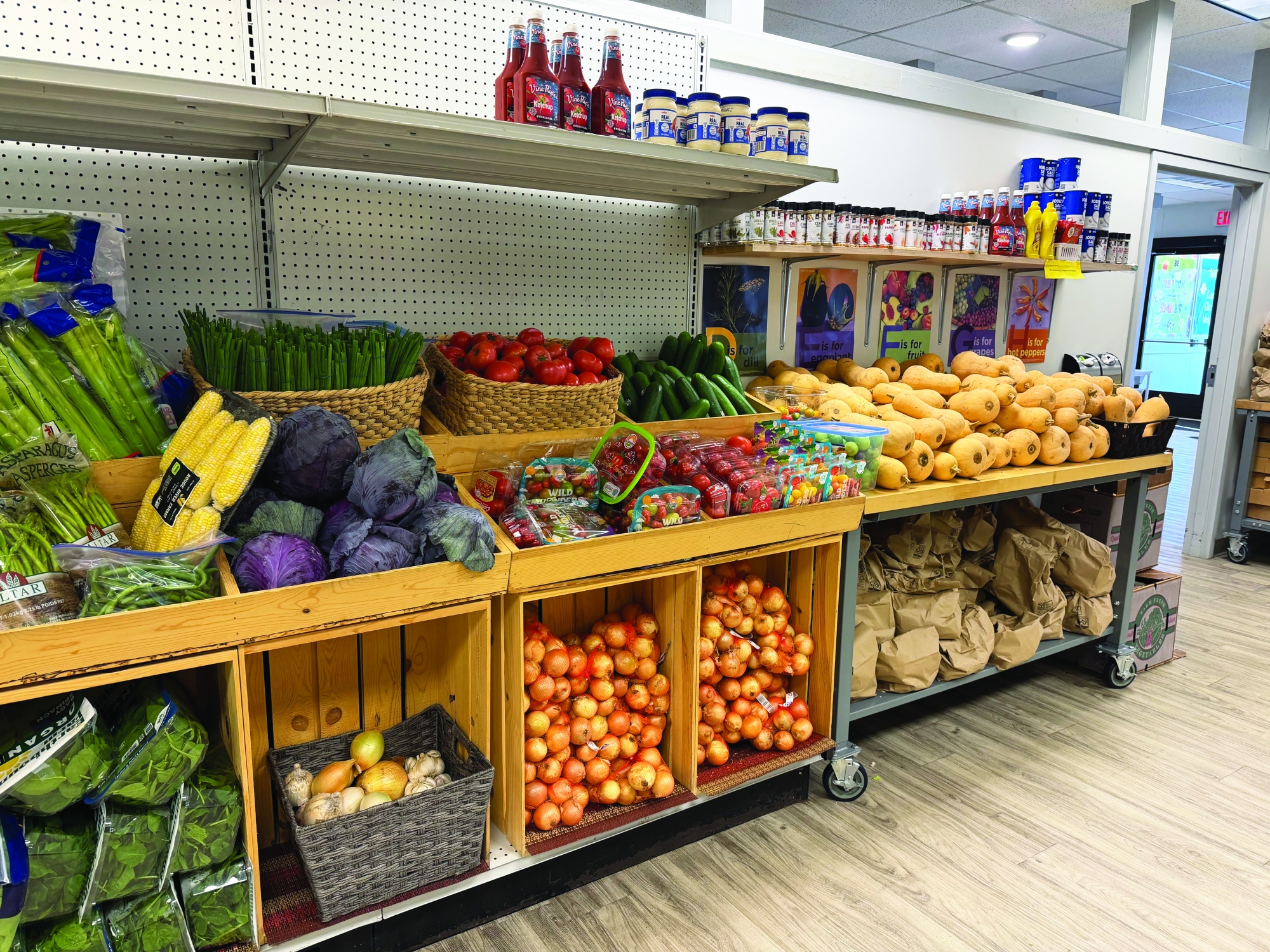A debate over the role of religion in public schools and in the public square has roiled tiny Leland, Michigan, this fall—the conversation a microcosm of an explosive reckoning on the national stage. Leelanau Lighthouse missionaries Micah and Kya Cramer have used their savvy Instagram marketing—and until recently, their regular presence inside Leland school—to attract dozens of local high school students to Sunday evening worships and other faith events. Concerned parents have raised concerns that the group was using lunch hour at school to “pursue” minors. This local conflict has generated whiplash for some. Five years ago, a community letter that addressed race relations during Black Lives Matter protests prompted neighbors to retreat and reinforce their political and cultural walls.
One week after Fernando Ramirez was released from the massive federal immigrant detention center in Baldwin, he sat beside his eldest grandchild Liam on Jan. 17 in a family member’s home in Grand Rapids and placed a lit candle in the 13-year-old boy’s birthday cake. “You are affectionate and charismatic. I wish you everlasting happiness,” the abuelo told the newly minted teenager. During his more than three months at the North Lake prison, Fernando became a leader and advocate for fellow prisoners in his pod—most of whom were Hispanic. Older than most, and fluent in English, he interpreted for them, bonded with them, encouraged them to eat meals, remain active and avoid sleeping too much. Meanwhile, his daughters Samantha and Nahomi quickly realized that they could play a critical role in supporting not just their father but his fellow detainees at North Lake. The sisters helped members of Fernando’s familia inside the prison walls reconnect with their own families. They interpreted for family members who didn’t speak English, and sometimes phoned the North Lake staff to share important medical information. Late last year they started a Facebook page called “Raíces Migrantes” to help families in West Michigan whose loved ones are detained by ICE—many of them at the North Lake facility in Baldwin.
Share this:
- Share on Facebook (Opens in new window) Facebook
- Share on X (Opens in new window) X
- Email a link to a friend (Opens in new window) Email
- Share on Reddit (Opens in new window) Reddit
- Share on Pinterest (Opens in new window) Pinterest
- Share on LinkedIn (Opens in new window) LinkedIn
- Print (Opens in new window) Print
- Share on Tumblr (Opens in new window) Tumblr
Report from the resistance to ICE’s invasion of Minneapolis: “We take the bags of groceries—dried beans, rice, cornmeal, plantains, avocados, fruit pulps, meats I don’t recognize and juices with names I can’t pronounce—and load them into the IKEA bags in my trunk. Quickly, in case Immigration and Customs Enforcement (ICE) agents are nearby. Five deliveries today, down to Eagan, out to Woodbury, and a few in St Paul. The car smells like tamales. This isn’t our usual Sunday afternoon Trader Joe’s run,” writes St. Paul resident Julia Wheeler Ludden, who was raised in Leelanau County. “We’ve been coming here for weeks now, picking up groceries to deliver to families “sheltering in place.” Usually reserved for natural disasters, this phrase now applies to many people of color in Minnesota. It’s anything but natural, and yet, two months into the largest federal immigration roundup operation in U.S. history, it has started to feel normal. White folks and brave Black and Brown U.S. citizens deliver a lot of food these days. We all follow the same protocols: Text when you arrive. Don’t knock. Expect dark windows, shades drawn. They’re home.”
Share this:
- Share on Facebook (Opens in new window) Facebook
- Share on X (Opens in new window) X
- Email a link to a friend (Opens in new window) Email
- Share on Reddit (Opens in new window) Reddit
- Share on Pinterest (Opens in new window) Pinterest
- Share on LinkedIn (Opens in new window) LinkedIn
- Print (Opens in new window) Print
- Share on Tumblr (Opens in new window) Tumblr
With daily reports flashing from major Midwestern cities of Immigration and Customs Enforcement (ICE) attacks on immigrants and communities of color, the Grand Traverse Band (GTB) of Ottawa and Chippewa Indians took the unprecedented step today of issuing an advisory to its tribal members to coach them on how to handle encounters with ICE agents. GTB chair Sandra Witherspoon told the Glen Arbor Sun that, while she has heard rumors of increased ICE activity in northern Michigan, she has no concrete evidence of a stepped-up presence in the coming days. Nevertheless, out of an “abundance of caution,” she said that tribal government decided to issue the advisory. Today’s advisory from the Grand Traverse Band encourages tribal members to carry their GTB Tribal ID card and to calmly identify their citizenship status if confronted by a federal agent. It also mentioned racial profiling practices now permitted under the Trump regime.
Share this:
- Share on Facebook (Opens in new window) Facebook
- Share on X (Opens in new window) X
- Email a link to a friend (Opens in new window) Email
- Share on Reddit (Opens in new window) Reddit
- Share on Pinterest (Opens in new window) Pinterest
- Share on LinkedIn (Opens in new window) LinkedIn
- Print (Opens in new window) Print
- Share on Tumblr (Opens in new window) Tumblr
On Nov. 17, citizens packed a meeting at the Garfield Township Hall in Kalkaska County to oppose a proposed data center on Department of Natural Resources (DNR) land. Seth Bernard, an accomplished Northern Michigan musician and activist, found himself high-fiving and hugging local conservatives with whom he had previously argued on Facebook about politics and cultural issues. Bernard, who lives near a pristine wetland—a few miles from the proposed site—found common ground with his Trump-supporting neighbors in their vehement opposition to data centers and mistrust of Artificial Intelligence (AI).
Share this:
- Share on Facebook (Opens in new window) Facebook
- Share on X (Opens in new window) X
- Email a link to a friend (Opens in new window) Email
- Share on Reddit (Opens in new window) Reddit
- Share on Pinterest (Opens in new window) Pinterest
- Share on LinkedIn (Opens in new window) LinkedIn
- Print (Opens in new window) Print
- Share on Tumblr (Opens in new window) Tumblr
One man returns home in his pickup truck from his job managing a fruit processing plant near Empire to greet his children as they step off the yellow school bus. Another shares a homemade dinner with his wife and kids, then naps before working the nightshift in the radiology unit at Munson Medical Center. A third man retreats upstairs and uses a hand-me-down sewing machine to mend a customer’s torn Christmas stocking—his side gig to make extra money for his family after he works daytime hours at Spectrum. These could be the stories of any hard-working men in Leelanau County. In fact, they represent the everyday rituals of three Afghan refugees who worked with the U.S. military and then fled for their safety after the Taliban took Kabul and seized power four years ago.
Share this:
- Share on Facebook (Opens in new window) Facebook
- Share on X (Opens in new window) X
- Email a link to a friend (Opens in new window) Email
- Share on Reddit (Opens in new window) Reddit
- Share on Pinterest (Opens in new window) Pinterest
- Share on LinkedIn (Opens in new window) LinkedIn
- Print (Opens in new window) Print
- Share on Tumblr (Opens in new window) Tumblr
Katie Dunn, a resident of Glen Arbor and Chicago, witnessed and wrote about Immigration and Customs Enforcement’s siege of Chicago neighborhoods last month. Dunn volunteered outside a school in a Latino neighborhood to safely escort students home, joined a protest outside the Broadview detention center, and found hope and resolve at the No Kings rally in Grant Park, which drew more than 100,000 demonstrators on Oct. 18. “Recent reports of ICE sightings near the school had sent a chilling wave through these already marginalized Brown and Black communities,” she wrote. “Countless parents, gripped by the tangible fear of being detained or disappeared by ICE in the mere minutes it takes to get their kids home from school, had entrusted their children’s safe passage to older siblings or neighbors. The whole landscape felt entirely dystopian: ICE’s menacing presence in the neighborhood had transformed a routine school dismissal into a fraught daily ritual.”
Share this:
- Share on Facebook (Opens in new window) Facebook
- Share on X (Opens in new window) X
- Email a link to a friend (Opens in new window) Email
- Share on Reddit (Opens in new window) Reddit
- Share on Pinterest (Opens in new window) Pinterest
- Share on LinkedIn (Opens in new window) LinkedIn
- Print (Opens in new window) Print
- Share on Tumblr (Opens in new window) Tumblr
County residents in need of food assistance flock each Monday afternoon to Leelanau Christian Neighbors, where the food pantry shelves are stocked with fresh vegetables, from onions to butternut squash, and canned goods that cover all the food groups. Some lined up early on Nov. 3, two days after the federal government froze funding for SNAP—more commonly known as food stamps—which approximately 42 million Americans rely on for food each month. The floodgates weren’t open yet. “Now this is the month they’ll get way behind,” LCN executive director Mary Stanton predicted. “I’m anticipating December and January will be tough—especially as utilities kick in. But we’ve had a great outpouring of the community anticipating that it will get bad.” At a perilous moment for working people, Leelanau Christian Neighbors are stepping up, along with other community organizations including Food Rescue and the Northwest Food Coalition, 5 Loaves 2 Fish, the Empire Area Food Pantry, Folded Leaf, Lively NeighborFood Market, Art’s Tavern and the Empire Area Community Center—all of which have pledged additional support.
Share this:
- Share on Facebook (Opens in new window) Facebook
- Share on X (Opens in new window) X
- Email a link to a friend (Opens in new window) Email
- Share on Reddit (Opens in new window) Reddit
- Share on Pinterest (Opens in new window) Pinterest
- Share on LinkedIn (Opens in new window) LinkedIn
- Print (Opens in new window) Print
- Share on Tumblr (Opens in new window) Tumblr
HIStory/HERstory: Whose Story? The Glen Arbor Arts Center poses this question in one of its most profound and timely exhibitions to date. Whose Story? is not simply an art show. It is a reckoning. The exhibition invites artists to examine who exactly shapes the narrative—to explore identity, legacy, and power. At its crux lies the question: who determines which stories are immortalized and which are relegated as derivative.
Share this:
- Share on Facebook (Opens in new window) Facebook
- Share on X (Opens in new window) X
- Email a link to a friend (Opens in new window) Email
- Share on Reddit (Opens in new window) Reddit
- Share on Pinterest (Opens in new window) Pinterest
- Share on LinkedIn (Opens in new window) LinkedIn
- Print (Opens in new window) Print
- Share on Tumblr (Opens in new window) Tumblr
The Trump administration’s federal policies and steep tariffs are adversely impacting Leelanau companies that sell chocolate, coffee, fruit and wine. “Never in my 23 years as a small business owner have I felt obstructed by our national government in my ability to operate, manage, and grow my business as I do now under President Trump,” said Grocer’s Daughter Chocolate co-owner Jody Hayden. “Like many small businesses, we’re feeling the effects of a very uncertain and volatile global economy.” On its most recent shipment of bulk chocolate, valued at $171,500, the small business based in Empire paid a tariff of $24,725 after Trump raised duties on Ecuadorian products to 15 percent on July 31.
Share this:
- Share on Facebook (Opens in new window) Facebook
- Share on X (Opens in new window) X
- Email a link to a friend (Opens in new window) Email
- Share on Reddit (Opens in new window) Reddit
- Share on Pinterest (Opens in new window) Pinterest
- Share on LinkedIn (Opens in new window) LinkedIn
- Print (Opens in new window) Print
- Share on Tumblr (Opens in new window) Tumblr










